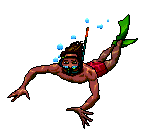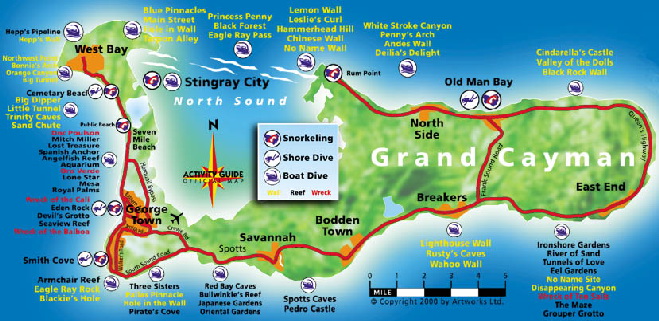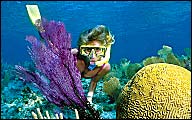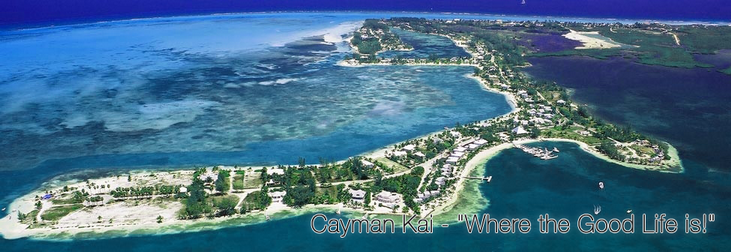- Robert Wagner
- Cell Phone
- (412) 977-8032
- "85 Degrees"
- Average Temperature
- "82 Degrees"
- Average Water Temperature
- "7"
- Average number of spectacular sunsets at Rum Point Beach in a week
|
|
|
|
| "Cayman Kai Vacations" chosen best Privately Owned Properties |
|
|
|
|










.htm_cmp_rmnsque100_vbtn.gif)

















































































.htm_cmp_rmnsque100_vbtn.gif)
















The Cayman Islands are surrounded by beautiful shallow reefs, teeming with marine life.
Snorkeling is Cayman's greatest, easiest adventure and an activity everyone can enjoy. If you've only fantasized about peeking beneath the sea, there is no safer, gentler and more exciting place to learn this sport than in Cayman's calm, clear, current-free waters.
From toddlers to
great-grandparents, snorkeling is ideal for all ages and a great family
activity. You'll practically rub noses with neon fish, float over coral gardens
- even stroke a friendly stingray at Stingray City.
Thanks to Cayman's strict Marine Parks laws, our protected healthy coral reefs
and abundant marine life remain our greatest natural attraction.
| Snorkeling Brochures | |
|
|
|
| Cayman Islands Snorkeling Guide |
|
| Cayman Islands Snorkeling Brochure |
|
Click on the PDF graphic symbol beside the file of your choice to view. Depending upon how you have your browser and computer set up, you may be asked to download the file to your computer or the file may open automatically in a new browser window.
Grab a mask, fins and snorkel, and discover unlimited fun and unforgettable adventures!
 |
Grand Cayman Snorkeling Sites
Rum Point Beach
- Some of the best snorkeling on the Island is just 150 feet from your front door at 'Rum Point Beach"
- where you explore right off the shoreline or the dock. You'll find coral formations and coral heads, schooling fish and a sandy bottom.
Eden Rock
 Clouds of sergeant majors and yellowtails surrounding Snorkelers feeding them;
this has become the trademark of Eden Rock, a popular snorkel site found just
south of Georgetown, Grand Cayman's main port and centre of commerce. Stairs cut
in the ironshore allow easy access to the water.
Clouds of sergeant majors and yellowtails surrounding Snorkelers feeding them;
this has become the trademark of Eden Rock, a popular snorkel site found just
south of Georgetown, Grand Cayman's main port and centre of commerce. Stairs cut
in the ironshore allow easy access to the water.
Meander out over the shallows until you find yourself hovering over a mass of huge coral heads connected by tunnels and caves. A dive shop on the shore provides rental gear and instruction as needed. If you continue to the south, you will find other great sites such as Devil's Grotto, a unique extension of Eden Rock. Devil's Grotto features the same massive, hulking coral heads with even more open chimneys and swim-through. Sprawling out along the shoreline (to the west) off these sites is a spur and groove formation of coral peaks and gullies leading out to the edge of the wall. This is segmented into reefs named after the resorts sitting on the shoreline. You will find Parrot's Reef, Seaview Reef and Sunset Reef. Each resort gives you gear rental, instruction and guidance. Enjoy!
Wreck of the Calie
The Cali was a four-masted schooner sunk just outside the harbour north of Georgetown in 1944. 220 feet long, she had been converted to diesel engines, the remnants of which are now spread across the bottom along with her hull. Declared a hazard to navigation, she was blown up shortly after her sinking. Her depth is a maximum of 24 feet at the sand, rising 10 feet off the bottom at places. You will recognize winches, boilers, hull plates and ribs nicely encrusted with sponges and corals. Shore access is excellent and the swim is just 75 yards. Watch for the resident population of Tarpon.
Wreck of the Gamma
The Gamma is an old freighter that has been sitting just off the shore north of the Cali for decades. Her hull is half exposed and half submerged and presents a striking view. Shore access is easy from a protected rough sand/crushed coral cove. She sits immediately offshore. Depths barely reach 10 feet. Many varieties of fish shelter under the stern while schools of silversides inhabit the interior. One snorkeller has even sighted a 300-pound jewfish. The ship's location is easy to find: walk to the shoreline just north of town and you can sight her. The entry cove is slightly north of the wreck.

Turtle Reef
North of Cemetery Reef is the Cayman Islands' famous Turtle Farm which is open to visitors. Offshore, just north of the farm, lies Turtle Reef. Snorkelers can access it through the shore facilities of Dive Tech.
- Cemetery Beach Reef
This patch reef is located near the north end of Seven Mile Beach off a waterfront cemetery (what else?). The entrance is from a lovely sand beach leading to that strikingly transparent turquoise water for which the Cayman Islands are so justly famed. The reef itself is a long, narrow patch reef in less than 10 feet of water. You will find some elk horn corals on the crown of this reef. The big attraction is the fish. Bring some food; make some friends. It's a bit of a swim, about 100 yards, and there is an occasional current, so be aware and cautious. All in all, an unforgettable snorkel site.
Coral Gardens
This shallow reef line is located on the inside of the barrier reef off the North Sound. Less than 10 feet to the bottom, she is known not so much for her reef structure as she is for her fish and invertebrate population. The coral itself is host to a multitude of small creatures clinging to her.
Above this are masses of fish such as grunts, yellowtails and sergeant majors along with many other visitors. This site is further offshore and can only be explored by booking with one of the many boats who visit there. Watch for the semi-resident green-sea turtle; it often pays Snorkelers a visit.
Sandbar & Stingray City
These two sites have become justly world-famous for the unusual interaction between Southern Stingrays and humans. For years, Stingrays have dined on the castoff portions of fish as local fishermen cleaned their catch and tossed the remnants overboard. Local divers discovered this community, developed it, and today, this gathering of rays (ranging from small to some four-feet across) accepts food and strokes alike from Snorkelers, all in complete safety. Sandbar is a pure-white sand ridge in just 3 feet of water off the North Sound, boat access only. You can literally stand and feed the rays from your hand. Stingray City reflects interaction in 12 feet of water. This is an extraordinary, not-to-be-missed adventure!
Wreck of the Geneva - Kathleen
The Geneva Kathleen - a two-masted, wooden-hulled, 200-foot plus schooner - met her demise on Grand Cayman's east end during a raging hurricane in 1929. It pushed her hard onto and then over the shallow barrier reef protecting the Cayman shore. Her remains sit there now in just seven feet of water, her iron winches and bollards encrusted by soft and hard corals. Enter via a protected beach (ask local dive shops for directions to the beach and the wreck) and snorkel right along the shoreline. A trail of artifacts will gradually lead to her grave just inside the reef. (Remember, artifacts are protected; please do not remove any items.) Currents here can sometimes be quite strong, but more often than not, it is as flat as a swimming pool. Check before you head out. It's a great snorkel site, but not for the beginner.
Smith's Cove
Located on the south side of Grand Cayman, Smith's Cove is a beautiful, protected limestone cove. The site features a white, sandy bottom with lovely coral head formations and small tropical fish. It is accessible from shore where there is a lovely picnic area for your pre- or post-snorkeling lunch.
Sunset Reef - East
Sunset Reef is a nice shallow reef area offshore but accessible by boat. Frequently used as a scuba training area, it features massive coral heads reaching from a twenty-foot bottom to the very surface (and beyond on a low tide). Shallower areas display a garden of sea rods, sea whips and such. Generally good visibility.
Half Moon Bay
This small, semi-circular bay features an exposed, limestone bottom pock-marked with holes, small ledges and other topographical features perfect for hiding little critters. This is its attraction, not magnificent coral heads, but fascinating smaller fish and invertebrates. Watch for crabs, shrimp, eels, sparkling tropical fish and more. Very shallow with an easy entrance.

|
Caribbean Vacation Grand Cayman Island Houses Rentals, Cayman Kai, Rum Point, Grand Cayman, Cayman Islands



